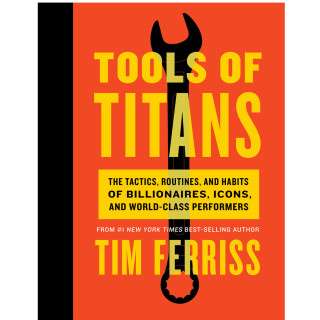4 Pieces of Life-Changing Advice We Wish We'd Gotten Sooner
The author of Tools of Titans: The Tactics, Routines, and Habits of Billionaires, Icons, and World-Class Performers has collected a few surprising tidbits of wisdom from some of wisest people on the planet. Here, a few of our favorites...

Photo: akindo/Getty Images
1. If You Can't Generate 10 Ideas, Generate 20
James Altucher—an American hedge fund manager who founded or co-founded more than 20 companies—recommends the habit of writing down 10 ideas each morning in a waiter's pad or tiny notebook. This exercise is for developing your "idea muscle" and confidence for creativity on demand, so regular practice is more important than the topics:
"What if [you] just can't come up with 10 ideas? Here's the magic trick: If you can't come up with 10 ideas, come up with 20 ideas. ... You are putting too much pressure on yourself. Perfectionism is the ENEMY of the idea muscle ... it's your brain trying to protect you from harm, from coming up with an idea that is embarrassing and stupid and could cause you to suffer pain. The way you shut [this] off is by forcing [the brain] to come up with bad ideas.
"So let's say you've written down five ideas for books, and they are all pretty good. And now you are stuck. ... Well, let's come up with some bad ideas. Here's one: Dorothy and the Wizard of Wall Street. Dorothy is in a hurricane in Kansas and she lands right at the corner of Broadway and Wall Street in New York City, and she has to make her way all the way down Wall Street to find 'the Wizard of Wall Street' (Lloyd Blankfein, CEO of Goldman Sachs) in order to get home to Kansas. Instead, he offers her a job to be a high-frequency trader. What a bad idea! Okay, now go on to the next 15 ideas.
"I [then] divide my paper into two columns. On one column is the list of ideas. On the other column is the list of FIRST STEPS. Remember, only the first step. Because you have no idea where that first step will take you. One of my favorite examples: Richard Branson didn't like the service on airlines he was flying, so he had an idea: 'I'm going to start a new airline.' How the heck can a magazine publisher start an airline from scratch with no money? His first step: He called Boeing to see if they had an airplane he could lease. No idea is so big that you can't take the first step. If the first step seems too hard, make it simpler. And don't worry again if the idea is bad. This is all practice."
2. "Busy" = Out of Control
"Every time people contact me, they say, 'Look, I know you must be incredibly busy...' and I always think, 'No, I'm not.' Because I'm in control of my time. I'm on top of it," says Derek Sivers, founder of CD Baby and a frequent speaker at TED conferences. "'Busy,' to me, seems to imply 'out of control.' Like, 'Oh my God, I'm so busy. I don't have any time for this!' To me, that sounds like a person who's got no control over their life."
Lack of time is lack of priorities. If I'm "busy," it is because I've made choices that put me in that position, so I've forbidden myself to reply to "How are you?" with "Busy." I have no right to complain. Instead, if I'm too busy, it's a cue to re-examine my systems and rules.
3. Do Less Than You Can
"How do you sustain your meditation practice up to the point that it becomes so compelling that it's self-sustaining?" asks Chade-Meng "Meng" Tan, the Google pioneer, award-winning engineer and best-selling author of Joy on Demand: The Art of Discovering the Happiness Within. "Do less than you can."
"I learned this from Mingyur Rinpoche, whose book The Joy of Living I most highly recommend. The idea is to do less formal practice than you are capable of. For example, if you can sit in mindfulness for five minutes before it feels like a chore, then don't sit for five minutes, just do three or four minutes, perhaps a few times a day. The reason is to keep the practice from becoming a burden. If mindfulness practice feels like a chore, it's not sustainable."
"My friend Yvonne Ginsberg likes to say, 'Meditation is an indulgence.' I think her insight beautifully captures the core of Rinpoche's idea. Don't sit for so long that it becomes burdensome. Sit often, for short periods, and your mindfulness practice may soon feel like an indulgence."
4. Don't Attribute Malice to That Which Can Be Explained Otherwise
"Wasn't it Bill Clinton who said that when dealing with anyone who's upset, he always asks, 'Has this person slept? Have they eaten? Is somebody else bugging them?' He goes through this simple checklist," says Alain de Botton, philosopher and best-selling author of How Proust Can Change Your Life. "When we're handling babies and the baby is kicking and crying, we almost never once say, 'That baby's out to get me,' or, 'She's got evil intentions.'"
 This adapted excerpt was taken from Tools of Titans: The Tactics, Routines, and Habits of Billionaires, Icons, and World-Class Performers, by Tim Ferriss. Copyright © 2017 by Tim Ferriss. Used by permission of Houghton Mifflin Harcourt Publishing Company. All rights reserved.
This adapted excerpt was taken from Tools of Titans: The Tactics, Routines, and Habits of Billionaires, Icons, and World-Class Performers, by Tim Ferriss. Copyright © 2017 by Tim Ferriss. Used by permission of Houghton Mifflin Harcourt Publishing Company. All rights reserved.



